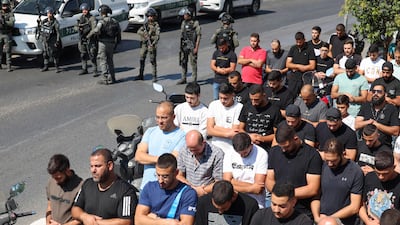Live updates: Follow the latest news on Israel-Gaza
Jerusalem is on “high alert”, with heightened security measures in place amid fears of violent unrest after Israeli-Palestinian tension escalated into a full-scale war over the past week.
Israel's military on Friday ordered 1.1 million residents of the Gaza Strip's northern region to relocate to the south of the Palestinian enclave within 24 hours.
The order is seen as a prelude to a ground invasion into the Hamas-controlled territory.
Security measures in Jerusalem were further reinforced before Friday prayers after Hamas called for mobilisation at Al Aqsa mosque, urging Arab citizens to attack Israeli forces in Jerusalem, Fleur Hassan-Nahoum, the city's deputy mayor, told The National.
“They are encouraging individuals to target security installations and security personnel, which has raised considerable concern,” she said.
Al Aqsa Mosque compound, a site holy to Muslims, Jews and Christians, has historically been a focal point for violence whenever Israeli-Palestinian tension flares up.

Ms Nahoum said there was a “quiet tension” among Jerusalem’s Arab and Israeli populations after the Hamas attack on Israel last Saturday and the ensuing bombing of Gaza by Israeli forces.
“We know Hamas has sleeper cells and they will activate them, and we know which communities they reside in. We are on alert,” she said.
“But majority of the Arabs are peaceful citizens who want to just do their day’s work and go home, just like us.”
On Thursday night, a man with a sub-machinegun opened fire on the entrance of Shalem Police Station in Jerusalem's Old City. Two police officers were wounded in the attack before the gunman was killed.
“We are used to this – both Arabs and Jews in the area. This is the sixth Gaza war. And people know how to not take it too personal and go about their day-to-day activities. We both want peaceful coexistence,” said Ms Nahoum.
'We want peace'
For the Arab residents of Jerusalem, the Gaza conflict is a flashpoint for communal tension. Arabs represent slightly more than 20 per cent of Israel’s population, and many living outside of Jerusalem have Israeli citizenship.
Waleed Abu Tayah, 68, an Arab citizen of Israel who was running for mayor in the recently postponed Jerusalem local elections, told The National that people were worried the conflict would spill over into the streets.
“We are scared and staying indoors. It is a very difficult moment for the community.”
“This fighting and bloodshed is not a solution to the problem. We have to decide what we want,” said Mr Abu Tayah, who has lived in Jerusalem for the past 44 years.
He said if Europe could find peace after long years of war, the Middle East could, as well.
“We have to stop this war and the bombing. Israel should release Palestinian prisoners and Hamas has to release the hostages. A peace settlement has to be reached so that this suffering will end forever.”
He said he wanted to contest the mayoral election to end the Arab boycott of political processes in the country.
“We have the right of self determination, according to the International convention on civil and political rights,” he said.
“Arabs pay all the taxes but they do not have civil rights. I want to uplift the Arab community out of poverty and economic disparity. They occupy our land. There cannot be justice under occupation. The status quo has to change.”


